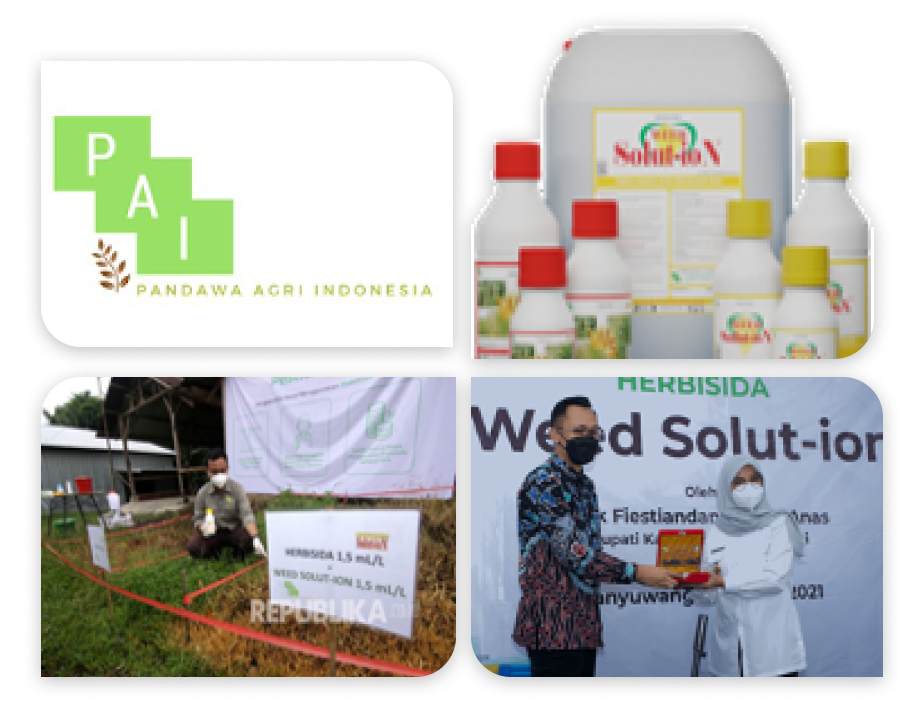WORKING
GROUP - RICE
Context:
Indonesia is one of the world's largest rice producers and consumers. The government had been implementing various policies and programs to support rice self-sufficiency, including subsidies for farmers and investment in irrigation infrastructure. However, the industry faced challenges related to land constraints, low yields, and the need for modernization. Efforts were ongoing to promote sustainable farming practices, improve rice varieties, and enhance post-harvest infrastructure. Additionally, the government aimed to reduce the environmental impact of rice cultivation through initiatives like the System of Rice Intensification (SRI).
Rice Working Group is a collaborative effort uniting private sector leaders, governmental bodies, non-profit organizations, and smallholder rice farmers, stands steadfastly committed to advancing productivity and livelihoods within the rice industry through sustainable and inclusive practices. Rice WG primary mission revolves around empowering smallholder rice farmers with the knowledge, resources, and ethical farming techniques essential for boosting rice yields, reducing environmental impact, and ensuring equitable economic benefits. Through a comprehensive suite of initiatives encompassing responsible land management, access to high-quality seeds, efficient water usage, and fair market access, the partnership strives not only to enhance smallholders' rice productivity and income but also champions responsible and eco-friendly rice farming. Rice WGserves as a shining example of the transformative power of public-private partnerships, demonstrating how collaborative efforts can drive positive change, secure the future of the rice industry, and uplift the well-being of rural communities in a sustainable and inclusive manner.
Activities :
- Providing comprehensive GAP support for smallholder farmers in 8 districts to ensure that at least 20,000 smallholder farmers increase productivity and increase their incomes by 20% against baseline measures
-
Impact :
- - 441.775 farmers participating.
- - 134.295 ha of land.
- - 30% smallholders has access to off-taker.
- - 56% smallholders has access to capacity building.
CASE STUDY - RICE - PANDAWA AGRI INDONESIA

Founded in 2014, Pandawa Agri Indonesia (PAI) is the first Indonesian agri life science company and is currently the only one in the world with innovation in pesticide reductant, a specialized formula made to reduce pesticides dose by up to 50%; enables farmers to significantly reduce the number of pesticides used, substantially saving cost, and preventing farmers and environment from overexposed to excessive chemicals contained in pesticides. In addition to reductants, PAI also established an end-to-end smallholders ecosystem, where farmers are fully assisted with good agricultural practices from the beginning of the planting to the harvesting time. PAI provides farmers with protocols and high-quality agriculture inputs to increase farmers' productivity, access to affordable financing, and fair trade to market theharvests.
BEFORE AND AFTER
INCLUSIVE CLOSED LOOP IMPLEMENTATION
| Indicator | Before | After |
|---|---|---|
| Production/Productivity | While records of pre-intervention productivity are unavailable, our endeavor has substantiated its capacity to enhance both the quantity and quality of crop yields. Upon integration into our ecosystem development, farmers associated with PPAI exhibit a remarkable 30% increment in crop yield, whereas non-PPAI farmers experience a more modest 5% upsurge. These figures underscore the pronounced influence and efficacy of our interventions. This can be attributed to the assimilation of methodical farming practices, more proficient resource allocation, and the augmented knowledge and skills imparted by the initiative. | Increased farmers productivity by 77% (on average for 56% of farmers) to 5.19 ton/ha (above the national productivity) |
| Market Access | Insufficient access to financial institutions with affordable financing | The availability of financing affords farmers the opportunity to establish a well-organized cultivation schedule and acquire essential resources, including certified seeds and micronutrient fertilizers of superior quality. Among the farmers, 86% express a sense of assistance stemming from the financial accessibility provided, with 68% of this group having been previously unbanked. Remarkably, 98% of farmers who receive financing through PAI report a notably simplified process of securing credit compared to traditional banking institutions. |
| Financial | Farmer's revenue pre-intervention: $341/mo. Farmer's profit pre-intervention: $30/mo Growth prospects: up to 40% | For smallholder farmers: increased income by up to 40% or additional monthly income of up to 5 million rupiah |
| Indicator | Before | After |
|---|---|---|
| Capability Building | Constrained access to comprehensive knowledge and training in sound agricultural practices has hindered farmers from enhancing their yield outcomes. | All 400 farmers are trained and assisted by Q3-2023 |
| Social Impact | Our commitment to developing the smallholders ecosystem has resulted in profound social impacts, benefiting farmers in numerous ways. These social impacts not only benefit individual farmers but also create a cohesive and empowered community working towards a more prosperous and sustainable agricultural sector. | A notable 21.43% of farmers have witnessed an augmentation in their household expenditures, while an impressive 58% of farmers surpass the threshold of the national poverty line |
| Indicator | Before | After |
|---|---|---|
| Innovation and Infrastructure | Insufficient productivity, subpar rice quality, inadequate transparency regarding commodity prices due to farmers' limited negotiation leverage, and restricted access to financial support. | Farmers have successfully established proactive cultivation schedules, resulting in increased yields and improved pricing opportunities. Additionally, they have instituted safeguards to mitigate losses stemming from crop failures attributed to natural factors. |
| Sustainability | Sustainability did not hold precedence; although farmers were aware of and had firsthand experience with the impacts of climate change, their understanding of effective mitigation strategies was limited. | Farmers exhibit enhanced climate resilience through their agricultural expertise, beginning with an adept comprehension of the causes underlying shifts in planting seasons and strategies to address such changes. Equally crucial is their awareness of the detrimental impact of excessive reliance on chemical-intensive pesticides, which can degrade soil quality over the long term and consequently impede yield potential. |